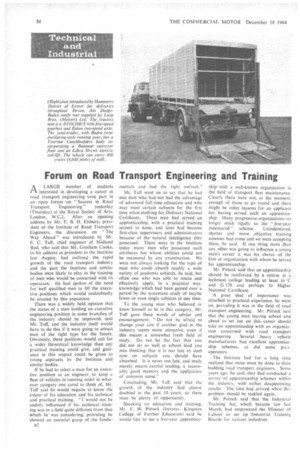Forum on Road Transport Engineering and Training
Page 36

If you've noticed an error in this article please click here to report it so we can fix it.
ALARGE number of students interested in developing a career in road transport engineering took part in an open fcrrum on "Success in Road
Transport Engineering" yesterday (Thursday) at the Royal Society of Arts, London, W.C.2. After an opening address by Mr. E. B. H. Els bury, president of the Institute of Road Transport Engineers, the discussion on "The Way Ahead" was introduced by Mr. E. C. Tuff, chief engineer of Midland Red, who said that Mr. Gresham Cooke, in his address as president to the Institute last August, had outlined the rapid growth of the road transport industry and the part the Institute and similar bodies were likely to play in the training of men who would be concerned with its operation. He had spoken of the need for well qualified men to fill the executive positions which would undoubtedly be created by this expansion.
There was a widely held opinion that the status of a man holding an executive engineering position in some branches of the industry should be improved, said Mr. Tuff, and the industry itself would have to do this if it were going to attract men of the right type for the future, Obviously, these positions would call for a wider theoretical knowledge than any practical training could give, and guidance in this respect could be given to young aspirants by the Institute and similar bodies.
If he had to select a man for an executive position as an engineer, to keep a fleet of vehicles in running order in whatever category one cared to think of, Mr. Tuff said he would require to know the extent of his education and his technical and practical training. "I would not be unduly influenced if his technical training was in a field quite different from that which he was considering. providing he showed an essential grasp of the funda
n/ mentals and had the right outlook."
Mr. Tuff went on to say that he had met men who had not had the advantage of advanced full-time education and who may meet certain subjects for the first time when studying for Ordinary National Certificate. These men had served an apprenticeship, with a practical training second to none, and later had become first-class supervisors and administrators because of the natural intelligence they possessed. There were in the Institute today many men who possessed such attributes but whose abilities could not be measured by any examination. We were not always looking for the type of man who could absorb readily a wide variety of academic subjects, he said, but often one who was able to retain and effectively apply, in a practical way, knowledge which had been gained over a period by the systematic study of maybe fewer or even single subjects at one time.
To the young man who believed or knew himself to be in this category, Mr. Tuff gave these words of advice and encouragement: "Do not be afraid to change your aim if another goal in the industry seems more attractive, even if this means a somewhat fresh field of study. Do not let the fact that you did not do so well at school lead you into thinking that it is too late to start now on subjects you • should have absorbed. It is never too late, and study merely means careful reading, a reasonably good memory and the application of common sense."
Concluding, Mr. Tuff said that the growth of the industry had almost doubled in the past 10 years; so there must be plenty of opportunity.
Speaking on education and training. Mr. F. W. Pittuck (lecturer. Kingston College of Further Education) said he would like to see a five-year apprentice ship with a well-known organization in the field of transport fleet maintenance. Clearly there were not, at the moment, enough of those to go round and there might be other reasons for an applicant not having served such an apprenticeship. Many progressive organizations no longer stuck rigidly to the "five-year indentured" scheme. Unindentured, shorter and more objective training schemes had come and we were accepting these, he said. If one thing more than any other was going to influence a young man's career it was his choice of the firm or organization with whom he served his apprenticeship.
Mr. Pittuck said that an apprenticeship should be reinforced by a course at a technical college leading at least to C and G 170 and perhaps to Higher National Certificate.
A great deal of importance was attached to practical experience, he went on, providing it was in the field of road transport engineering. Mr. Pittuck said that the young man leaving school and about to set out on this career should take an apprenticeship with an organization concerned with road transport engineering. Several heavy vehicle manufacturers had excellent apprenticeship schemes, as did some p.s.v. operators.
The Institute had for a long time realized that more must be done to train budding road transport engineers. Some years ago. he said, they had conducted a survey of apprenticeship schemes within the industry, with rather disappointing results. The time had arrived when this problem should be tackled again.
Mr. Pittuck said that the Industrial Training Act, which became law last March, had empowered the Minister of labour to set up Industrial Training Boards for various industries.








































































































